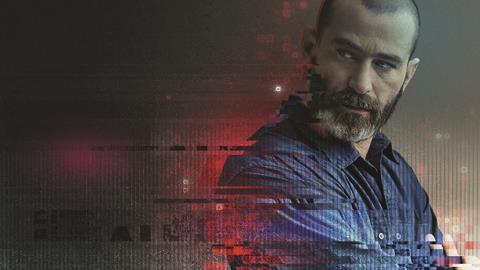‘Delves into, espionage, action and danger. International audiences know and search out these elements’
Distributors Keshet International
Producer Shenhar Productions
Length 9 x 60 minutes
Broadcasters Keshet 12 (Israel)
Keshet International is heading to Mipcom with Trust No One as its flagship scripted title. The nine-part, high-stakes psychological thriller, produced by Shenhar Productions for Keshet 12, will land in Cannes having already secured a 20-territory deal with Netflix.
The series, set against the backdrop of Israeli military intelligence and cyber security, stars Yehuda Levi as Itamar, the youngest-ever director of the most powerful intelligence agency in Israel. Itamar has forged a career by recruiting and handling well-connected informants, but is now facing the worst crisis of his life.
Itamar is being framed as the source of a cybersecurity leak that is exposing top-secret agents one by one. Itamar soon realises that with every decision he makes, someone else is one step ahead of him, feeding information to the leak site. It can only be a trusted member of his inner circle.
Totally isolated and no longer able to trust anyone, Itamar is forced to use the morally questionable espionage tools he has always opposed to clear his name and save his agents’ lives.
“The questions it raises about privacy and security don’t just affect governmental organisations, they reach far into private lives as well”
KI managing director of distribution Kelly Wright is upbeat about the show’s prospects on the international stage: “Trust No One is the most expensive production that’s ever been on Keshet’s screens,” she says. “And the creative team – Ron Leshem (Euphoria), Amit Cohen (False Flag) and Daniel Amsel (The Gordin Cell) – has an amazing collective track record.
“There’s also the fact that Trust No One delves into an area Israel is known for – espionage, action, danger. International audiences know and search out these elements.”
Wright believes the show is timely, too: “It centres on the hack of an organisation that is supposed to be an impermeable entity,” she says. “The questions it raises about privacy and security don’t just affect governmental organisations, they reach far into private lives as well. It’s all about trust and how far organisations are willing to go to protect people.”
Alongside the show’s own creative merits, Wright believes the knock-on effects of the US writers and actors strikes could open up new opportunities for Trust No One, as “there are gaps opening up in some schedules”.
KI has enjoyed success distributing its scripted shows as both tapes and formats. So how does Wright expect the format strategy to unfold?
“We have three production entities in the UK, Germany and the US, which are aware of shows coming to screen in Israel,” she says. “They would typically be involved in determining whether one is right for international adaptation.
“Right now, it might be an opportunity for other global buyers to get there first with format adaptations. India or Korea might be interested.”
In terms of where Trust No One might play, Wright says it can “run the gamut of buyers”.
Keshet 12 is a free-to-air commercial channel, but this series “would play equally well on mainstream streamers”, she adds.
Plans are already under way for a second season, another factor that buyers will welcome.
International Scripted

Davey & Jonesie’s Locker heads up an eclectic array of global dramas and comedies including Bargain, Estonia, Strife and Obituary




















































No comments yet